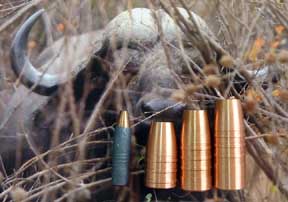

 The Accurate Reloading Forums
The Accurate Reloading Forums  THE ACCURATE RELOADING.COM FORUMS
THE ACCURATE RELOADING.COM FORUMS  Rifles
Rifles  Big Bores
Big Bores  Single and Double Square Bridge Mausers
Single and Double Square Bridge MausersGo  | New  | Find  | Notify  | Tools  | Reply  |  |
one of us |
Some information please, what makes these actions so desireable for big bores? Why the difference between single and double square bridges. Most of the square bridge mausers I have seen, and although not many, have not been tapped for scope mounts and seem to be iron or peep sights only. Does anyone ever use them with a scope? Are these actions rare. Are they better than non square bridge actions. Thanks.   | ||
|
| One of Us |
I did not know the dsb magnum actions came with a clip cutout on the left side. What is the chambering? Rich | |||
|
one of us |
Neither of these rifles are mine. Top is a G&H 375 and bottom is a Hoffman 404 Jef. | |||
|
| One of Us |
Are these not SINGLE square bridge actions. I have a SINGLE square bridge that was originally a Westley Richards in 318 Accellerated and it has the thumb slot. SCI Life Member NRA Patron Life Member DRSS | |||
|
one of us |
Both are single square bridges, I didn't have a pic of a double square bridge. Sure would like some info on both of these types. | |||
|
| One of Us |
The square bridge was developed by Mauser about 1905 or so to give an integrel base for a rear scope mount. When a factory mount is installed, a square hole is cut in the bridge and a push button is installed on the left side of the bridge with a detent to affix/ release the scope. the front mount base is a dovetailed piece installed either through the receiver ring, or in a boss on the barrel in typical claw mount style. During the mid 30's, Mauser started leaving the top of the receiver ring flat with extra metal on the sides[square], to match the bridge as added support for the front base dovetail. This allowed the dovetail slot to be cut shallower so action strength was not affected as much. Most, if not all, of these "double square" actions also have a solid left wall, with only a vestage of the thumb slot remaining in the top of the sidewall. Most single square actions have the thumb cut, however some later actions have the solid wall. I believe that when Rigby [Mauser's agent in England from 1898 through 1912] saw the square bridge action, they liked the clean view of the sights afforded by this action, and ordered their propriety actions with the square bridge. Rigby was the source for all Mauser actions at the time, so many other makers got these actions as well. Starting in 1912, Jeffery was Mauser's agent, and he continued specifing the square bridge on his actions. In original mauser rifles, uncut square bridges are found on most all magnum actions,.404, .280 8x78, etc. They are on.318, most 30-06 and some 7x57 standard length actions. The most common K action to have a square bridge [ as if any K action is common] is the one made for the .250-3000. Square bridges can be found on any caliber action that was factory scoped. All the best, SXS | |||
|
| One of Us |
thanks to all for the education on Mausers. I have been caught up in P14-17's and M30 Express Remingtons, do not know much at all about pre-war mausers. This is good to learn. Rich | |||
|
| One of Us |
a double square bridge gives two horizontal surfaces in line for mounting scopes. someimes the english modified the bridges to use them as the bases. i don't know that the germans did this - they may have put their beloved claw mounts on top of them. generally the preferred method for the forward base on a single square bridge is a base on a barrel band or an island base . dovetailing the receiver ring is never a very good idea. for claw mounts , if they must go on the ring, a saddle holding the base plate is sweated or screwed onto the front ring. TOMO577 DOUBLE RIFLE SHOOTERS SOCIETY | |||
|
| Powered by Social Strata |
| Please Wait. Your request is being processed... |
|
 The Accurate Reloading Forums
The Accurate Reloading Forums  THE ACCURATE RELOADING.COM FORUMS
THE ACCURATE RELOADING.COM FORUMS  Rifles
Rifles  Big Bores
Big Bores  Single and Double Square Bridge Mausers
Single and Double Square Bridge Mausers

Visit our on-line store for AR Memorabilia

